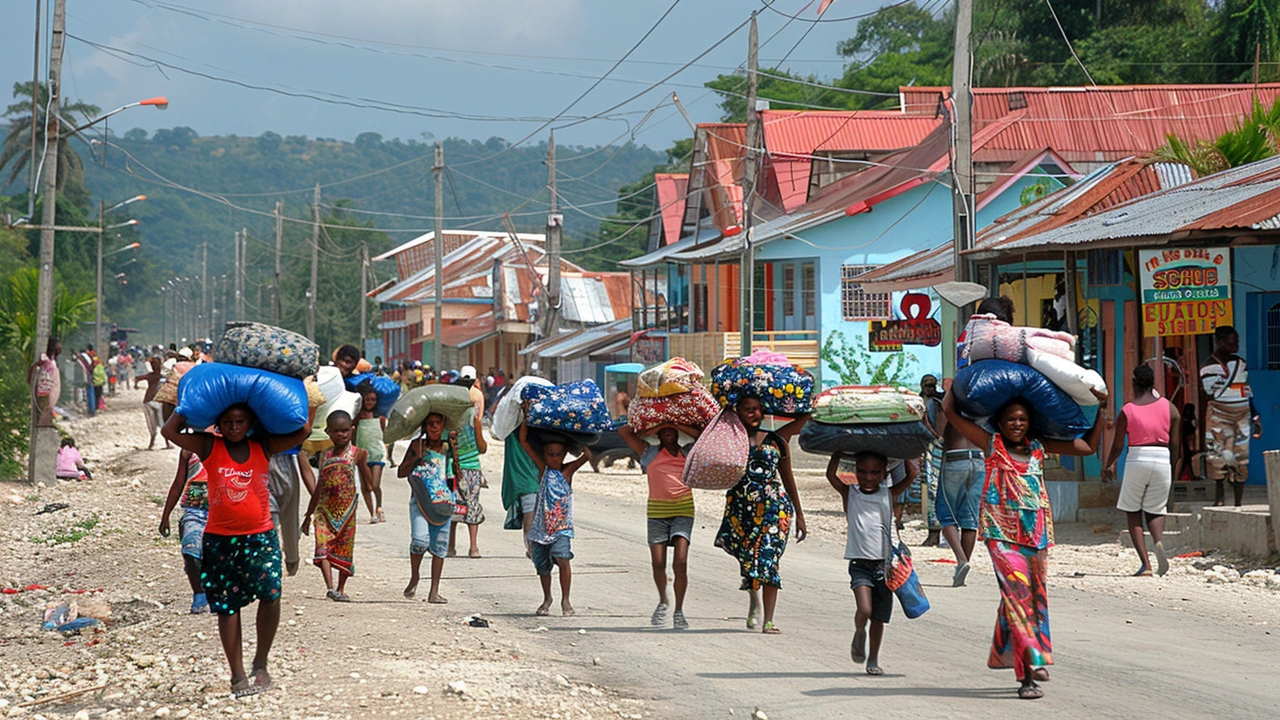
Haiti's Escalating Crisis: Gang Violence Displacing Hundreds of Thousands
The dire situation in Haiti has reached a critical point as gang violence intensifies, leading to the displacement of over 300,000 children, according to the United Nations. Reports from the UN Office for the Coordination of Humanitarian Affairs (OCHA) state that the deteriorating conditions in Haiti have led many children to flee their homes in search of safety. These young lives are now caught in the turmoil of a country struggling to mitigate widespread lawlessness and violence, primarily in the capital city of Port-au-Prince.
The statistics are nothing short of alarming. Between January and May 2022, at least 234,000 people, of which 123,000 are children, were driven from their homes due to the pervasive gang violence. The OCHA disclosed that displacement figures have surged by 167% compared to the same period in the previous year. This stark increase highlights the urgency of addressing the root causes of the violence that has engulfed the nation.
The Root Causes of Haiti's Gang Violence
Haiti's deep-seated social and economic issues have significantly contributed to the current upheaval. The assassination of President Jovenel Moïse in 2021 plunged the country into an unprecedented power vacuum, exacerbating an already precarious situation. The rampant gang violence is, in part, a manifestation of these unresolved political tensions and economic challenges. The Haitian government's failure to provide adequate security and address these critical issues has left the population vulnerable and exposed to increasing dangers.
The role of these gangs cannot be understated. Many of them have connections with political groups, adding layers of complexity to an already complicated situation. They control entire neighborhoods, extort businesses, and are frequently involved in violent confrontations with rival factions. As a result, ordinary citizens are often caught in the crossfire, with children bearing the brunt of the chaos.
Efforts to curb the violence have been largely ineffective, with many criticizing the Haitian government for its inability or unwillingness to take decisive action. The lack of a cohesive security strategy has allowed gangs to operate with impunity, spreading fear and instability across communities. This lawlessness also disrupts essential services, further complicating the lives of those displaced and seeking safety.
The Humanitarian Response and International Appeal
The United Nations has issued a dire warning that the situation will likely worsen unless urgent measures are implemented to tackle the underlying issues fueling this crisis. The call to action resonates across international communities, urging for increased support to provide humanitarian aid to those affected by the violence. Essential resources such as food, clean water, shelter, and medical supplies are in dire need to prevent further humanitarian fallout.
The UN's recommendations are clear: increased international support and immediate government action are essential. With the country already grappling with significant issues like a cholera outbreak and severe economic challenges exacerbated by the COVID-19 pandemic, the current healthcare system is stretched beyond its limits. International aid organizations are critical in bridging this gap, providing the necessary support to the displaced children and families struggling with these compounded crises.
Additionally, international advocacy and diplomatic pressure on the Haitian government are necessary to push for reforms and the establishment of a stable security framework. Without addressing these fundamental issues, efforts to curb gang violence and protect civilians, especially children, will remain insufficient.
The Role of the Haitian Government
While international support is undoubtedly vital, the Haitian government must take primary responsibility in this crisis. The rampant violence and displacement underscore the administration's inability to govern effectively amidst severe instability. Effective government intervention requires not only enhancing security measures but also addressing the underlying social and economic problems that gangs exploit.
Furthermore, the government should focus on policies that offer long-term solutions, such as employment programs, educational opportunities, and community-building initiatives. Empowering local communities can help reduce the influence of gangs and provide a more hopeful future for the nation's youth. Structural reforms aimed at rooting out corruption within the political system and law enforcement agencies are equally crucial in restoring public faith and order.
Stories from the Ground
The human stories behind these statistics add a poignant layer to the crisis. Families forced to abandon their homes with only what they can carry tell tales of nights spent in fear, dodging stray bullets, and seeking refuge wherever they can find it. Children, who should be in school, are now refugees within their own country, their lives disrupted, and their futures uncertain.
Temporary shelters are often overcrowded and lacking in basic amenities. Volunteers and aid workers report that these conditions, coupled with the trauma of displacement, significantly impact the mental health of young children. Many of them display signs of anxiety, depression, and post-traumatic stress disorder, conditions that are difficult to address without adequate healthcare services.
Immediate efforts to provide mental health support and educational continuity are crucial. Programs designed to offer psychological counseling and safe spaces for learning can help mitigate some of the long-term damage caused by this crisis.
The Path Forward
The UN's report calls for an urgent and multifaceted approach to tackle Haiti's ongoing crisis. While the immediate needs of those displaced by gang violence are a top priority, long-term strategies to ensure stability and security must also be developed and implemented. The combination of international support and robust governmental action can pave the way for a safer and more prosperous future for Haiti and its children.
Ultimately, the plight of Haiti's displaced children shines a light on the broader issues of governance, economic disparity, and social justice within the country. Addressing these systemic problems requires unwavering commitment and collaboration from both the Haitian leadership and the global community. Only through sustained effort and empathetic intervention can we hope to provide the children of Haiti with the safety and future they deserve.





